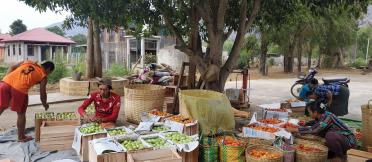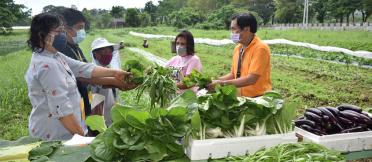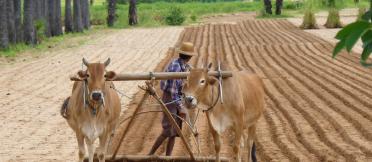‘The project has successfully developed the framework and approach necessary to initiate high-quality vegetable supply chains in developing countries.’ Liam Southam-Rogers
Mr Hall explains that farmers participated in the six-month Myanmar Good Agricultural Practices (GAP) program to accredit them in best-practice farming. However, he says, ‘without someone on the ground encouraging them to connect with retailers it was not getting any traction’.
‘The mid-term review recommended the appointment of an in-country local coordinator, which was to be Ms Shoon Lae.’
Appointed in December last year, Ms Lae is an agronomist with food consultancy Fresh Studio, based in Nyaungshwe in the ‘vegetable bowl’ of southern Shan State.
Ms Lae became the main contact point for market engagement and promoting vegetable selling and production to local farmers. She and her Fresh Studio colleague, agricultural economist Hnin Hnin Wai, established a rigorous pesticide monitoring program to ensure production of safe vegetables to MyanmarGAP standards, and through regular visits encouraged market linkages with Yangon.
The final step was to appoint Myanmar logistics company Future Glory to package and transport the initial truckload of tomatoes to Yangon and liaise with retailers there. Future Glory labels the tomatoes as MyanmarGAP-accredited for easy recognition at the point of sale.
‘The first shipment of tomatoes was very well received by shoppers at Metro and City Mart and we are now sending capsicums and snow peas to Yangon from MyanmarGAP farmers in the Pindaya region,’ Ms Lae says.
Urban supermarkets also require farmers to sort and grade their vegetables according to size and colour, and this has created feedback to a fourth partner: Yezin Agricultural University (YAU).
When some of the initial shipment of tomatoes was judged to be overripe, Ms Lae—a graduate of YAU—contacted the university to initiate post-harvest trials and give feedback directly to the farmers.
The university was already running farm-based trials to assess new vegetable varieties, improve crop establishment and expand the range of crops that could be grown by the small landholders of Shan State.
‘This has shifted the university’s focus from research gathering to acting on information received directly from the retailers to advise farmers on ensuring their produce is market-ready,’ Ms Lae says.
Having local staff on the ground in southern Shan State has greatly helped the supply chain to weather the effects of the COVID-19 pandemic and subsequent restrictions on travel.
‘I can monitor consignments for pesticide residue and manage the packing with the farmers while our Fresh Studio staff in Yangon can assess the quality of consignments when they arrive at the supermarkets,’ Ms Lae says.
‘Future Glory has been very happy with the process and is steadily increasing its orders.’
Mr Hall says this type of local interaction and support is the key to establishing more supply chains in developing countries.
‘It’s local coordinators working with the local people and then the science, in that order, that has made the difference,’ he adds.





